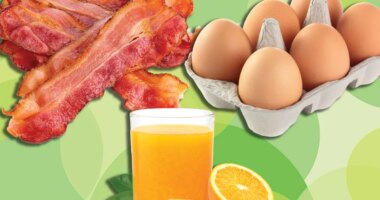If you have high blood pressure, know that you are not alone. With a whopping 116 million Americans having this condition (that’s nearly half of all Americans!), finding ways to manage high blood pressure is a common goal for many.
So, how can all of these people manage their blood pressure safely and effectively? Of course, there are medications people can take that can lower blood pressure under the supervision of a health care provider. And when it comes to lifestyle choices, exercising regularly, maintaining a healthy weight, and managing stress have all shown promise in the quest to maintain healthy blood pressure.
Your diet can also have a profound impact on your blood pressure. A tried-and-true dietary pattern that has shown promise for blood pressure management is the Dietary Approaches to Stop Hypertension diet (aka the DASH diet).
To follow the DASH diet, people are advised to focus on eating more produce, whole grains, and beans. Fat-free or low-fat dairy products, fish, poultry, and nuts also make up a prominent part of this diet, as does limiting foods that contain high amounts of saturated fat and sodium. This diet also emphasizes the consumption of the minerals calcium, magnesium, and potassium.
The American Heart Association recommends no more than 2,300 milligrams of sodium a day, with an ideal limit of no more than 1,500 milligrams per day for most adults, especially for those with high blood pressure.
Many fast food menu items are notorious for being high in sodium and saturated fat—two “no-nos” when it comes to managing blood pressure. And, unfortunately for fast food lovers, data shows that eating fast food is linked to elevated blood pressure.
Yet, eating fast food isn’t a rare occurrence for a large proportion of the population, with 36.6% of adults consuming fast food on a given day according to a report published by the CDC. Since 47% of Americans have high blood pressure, it is safe to assume that at least some of the people who are frequenting fast food establishments have this condition.
If you are a fast-food lover and you are focused on keeping your blood pressure in check, it would behoove you to stay away from these six fast-food menu items, as these are the six fast-food orders to avoid if you have high blood pressure.
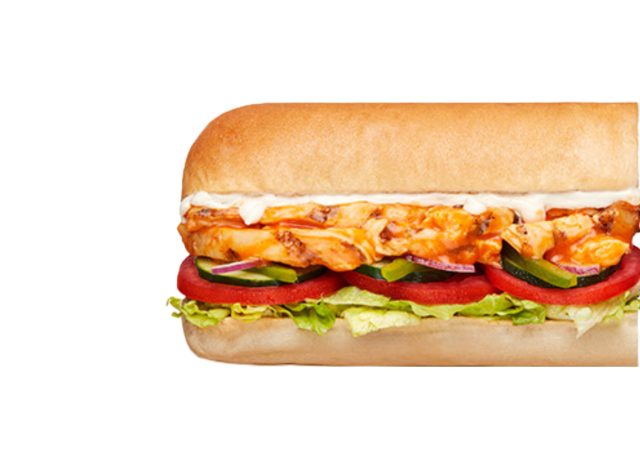

PER 6-inch SUB: 340 calories, 12 g fat (3 g saturated fat), 55 mg cholesterol, 1360 mg sodium, 39 g carbs (2 g fiber, 4 g sugar), 24 g protein
Even if you are just getting a 6-inch version of this sandwich, you will be exceeding the 1,500-milligram sodium limit right off the bat, as this sub contains 1,990 milligrams per half a footlong. And while you can get a nice whole grain boost if you skip the white bread and a helping of heart-healthy veggies if you choose the right toppings, you will be better off opting for a menu item with less sodium per serving for sure—like the Rotisserie style chicken salad, which contains only 470 milligrams of sodium per serving.
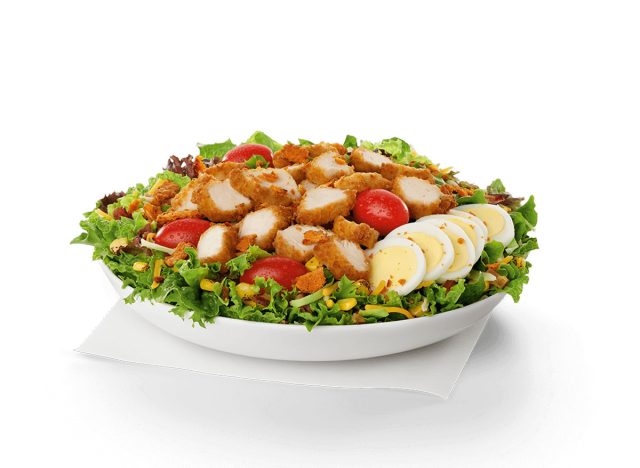

PER 1 COBB SALAD WITH NUGGETS: 850 calories, 61 g fat (13 g saturated fat), 235 mg cholesterol, 2200 mg sodium, 34 g carbs (5 g fiber, 9 g sugar), 42 g protein
If you think that choosing a salad is the best menu choice if you have high blood pressure, think again! Sure, a salad is chock-full of heart-healthy vitamins and minerals, but at 2,200 milligrams of sodium per serving, this salad is a sodium bomb that should be avoided if you are managing your blood pressure.
READ RELATED: Lift weights five days a week to get stronger but just push hard once a week to get big muscles
If you are looking for something that is satisfying and also heart-healthy, Chick-fil-A’s Greek yogurt parfait only contains 80 milligrams of sodium along with a boost of calcium, magnesium, and potassium—three minerals that are emphasized on the DASH diet.
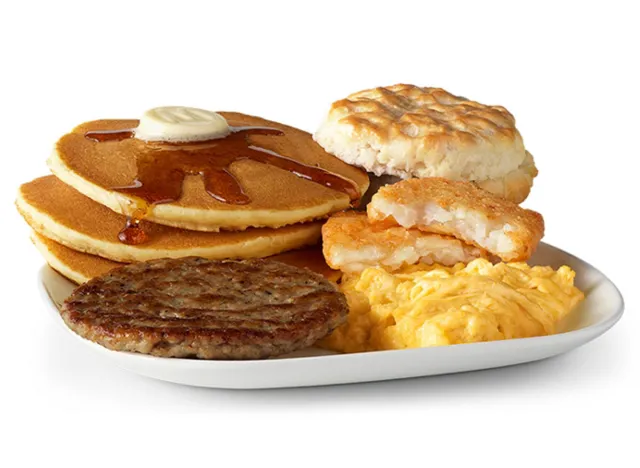

PER 1 ORDER: 1340 calories, 63 g fat (24 g saturated fat), 525 mg cholesterol, 2070 mg sodium, 158 g carbs (5 g fiber, 48 g sugar), 36 g protein
Surprised that a gigantic sandwich isn’t the #1 menu item to avoid if you have high blood pressure? The Big Breakfast with Hotcakes clocks in at 2,150 milligrams sodium and contains highly-processed meats, fried potatoes, and super-sugary syrup—all things that are contraindicated on any heart-healthy diet. Thankfully, McDonald’s offers a delicious oatmeal to meet your breakfast needs.
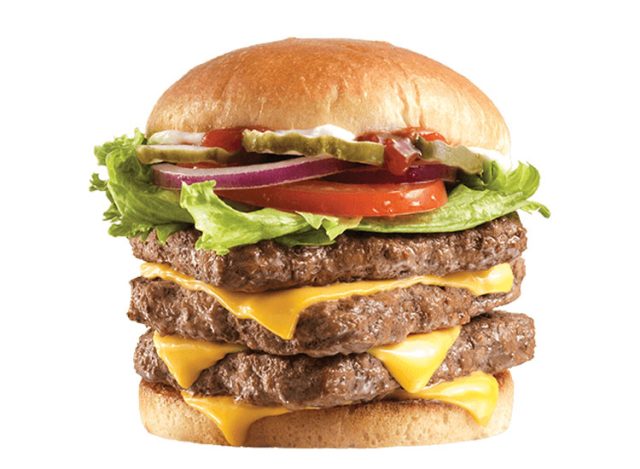

PER 1 BURGER: 1160 calories, 81 g fat (334 g saturated fat, 4.5 g trans fat), 200 mg cholesterol, 1570 mg sodium, 38 g carbs (2 g fiber, 8 g sugar), 70 g protein
A single patty burger is nothing to feel sorry about eating. Beef contains many key nutrients that many of us need more of, including iron and zinc. But tripling your patty serving and topping each burger with cheese and other high-fat and high-sodium ingredients is a recipe for a sodium-ridden meal.
Dave’s Triple sandwich clocks in at 1,570 milligrams of per serving, making it one of the saltiest menu items at this fast food joint.
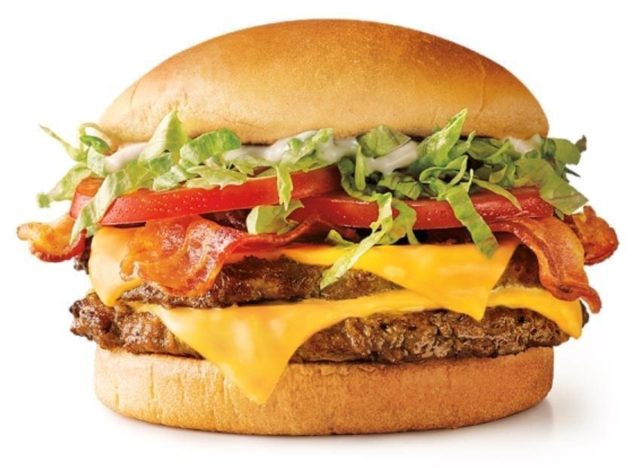

PER 1 BURGER: 1190 calories, 83 g fat (24g saturated fat), 155 mg cholesterol, 2020 mg sodium, 52 g carbs (2 g fiber, 10 g sugar), 58 g protein
Double the bacon, double the burger, and double the cheese naturally means double the sodium. If you are a SONIC lover, their Bacon Double Cheeseburger contains 2,020 milligrams—nearly the maximum amount of sodium allotted in an entire day!
Honestly, if you have high blood pressure, you will be hard pressed to find many menu items at Sonic that meet your needs, as most items are high in sodium or are fried. And while some of their desserts are sodium and fat-free, they are loaded with added sugars, which isn’t something people who are supporting their heart health should be eating in large quantities.
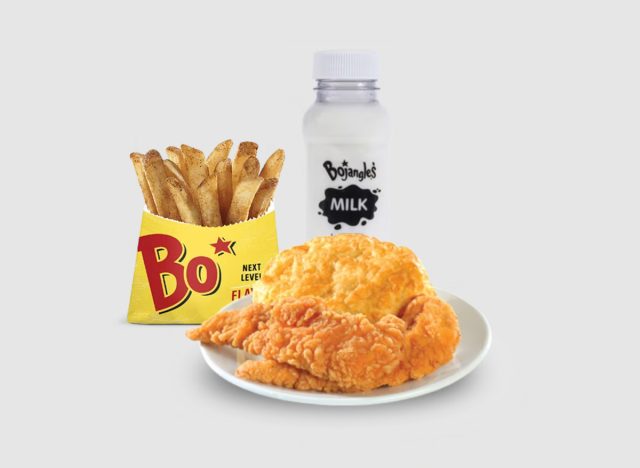

PER 1 KIDS MEAL: 570 calories, 27 g fat (10 g saturated fat), 40 mg cholesterol, 1850 mg sodium, 61 g carbs (3 g fiber, 7 g sugar), 22 g protein
Among all of the menu items at Bojangles, one of their kids’ meals tops the list when it comes to having a heaping amount of sodium. Their 2-piece homestyle tenders kids meal contains 1,850 milligrams of sodium per serving—far too much sodium for a child, and borderline too much for an adult with high blood pressure.
Source:






